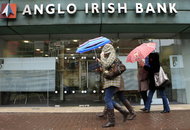MOSCOW — The Irish government is promoting a partnership with one of Russia’s largest banks to help seize assets in the former Soviet Union belonging to Sean Quinn, a bankrupt Irish businessman who was once the country’s richest man.
The government-owned Irish Bank Resolution, which is trying to recoup losses from the collapse of the Quinn family’s real estate empire, has been working with Alfa Group, which is controlled by the billionaire Mikhail Fridman and other wealthy Russians.
The Irish hope to seize a dozen properties in Russia and Ukraine, Ireland’s ambassador to Russia, Philip McDonagh, said Wednesday at a news conference in Moscow.
Mr. McDonagh said Alfa Group, the conglomerate that recently exited a joint venture with BP in Russia, TNK-BP, would be “successful in asserting the claims over the properties in question for the benefit of the Irish state.”
Mr. Quinn, 65, is under investigation for avoiding payment of €2.8 billion, or $3.5 billion, in loans he owes to Irish Bank Resolution, formerly Anglo Irish Bank, which seized the Quinn Group Conglomerate in 2011.
His downfall, brought on by ruinous investments and the global financial crisis, came to personify the Irish economic collapse. Mr. Quinn declared bankruptcy and he, his son, and a nephew were jailed for contempt of court for hiding assets from the bank acting as a bankruptcy receiver.
The receiver has linked up with the asset recovery branch of Alfa Bank, called A1. Alfa Bank is known for its aggressive litigation in Russia’s civil arbitration courts in legal conflicts with BP and other Western businesses. Alfa’s suit against BP in 2011, for example, kept the British oil giant from joining a venture to explore the Arctic Ocean with Rosneft, the state oil company.
On Wednesday, Dmitry Vozianov, the acting director of A1, said of Mr. Quinn’s investments in Russia: “If we say we’re going to return the assets, then there is no doubt that we will get them.”
Directors of A1 said Wednesday that they would receive 25 percent to 30 percent of the value of any assets recovered under the agreement.
Representatives for A1 and the Irish bank said they were seeking to recoup as much as $500 million by seizing Quinn holdings including shopping malls in Moscow and Kiev and an office tower in Moscow.
Article source: http://www.nytimes.com/2013/04/04/business/global/irish-search-for-billionaires-assets-leads-to-russia.html?partner=rss&emc=rss

